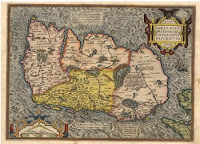The first mass arrival of Normans in Ireland was actually by invitation of Diarmait Mac Murchada, King of Leinster until he was deposed by the
High King of Ireland, Ruaidrí Ua Conchobair. Diarmait got military aid from Richard de Clare, the 2nd Earl of Pembroke, with King Henry's permission. In exchange, Pembroke would receive Diarmait's eldest daughter's (Aoife) hand in marriage.
Offering allegiance to Henry for the support, Diarmait led Pembroke's Anglo-Norman forces around to some of the neighboring kingdoms, subduing them within weeks. That was not to be the end of it, however.
Pembroke continued to bring military forces, seizing Dublin and Waterford in 1170. With Diarmait's death in May 1171, Pembroke (by virtue of his marriage to Aoife) declared himself Lord of Leinster. This was too much for the Irish, who planned a counteroffensive, besieging Dublin and attacking the Norman-controlled Waterford and Wexford. The Normans were too strong and entrenched, however.
Five months after Diamait's death, Henry himself landed with a large army to assert control over the Irish and the Anglo-Normans, lest they tried to be too independent. He declared any of the Norman-controlled towns as crown lands and gave Pembroke Leinster as a fiefdom. Many Irish kings submitted, probably hoping to prevent further conquest, but Henry gave Meath to Hugh de Lacey, and William FitzAldhelm got Wexford.
Henry also arranged the Synod of Cashel to reform the Irish Church. Henry had the blessing of the Roman Catholic Church. The Church (especially the Archbishops of Canterbury) wanted to make sure the Irish Church was conforming properly: they had not fully adopted the Gregorian Reforms. Pope Adrian IV in a 1155 papal bull, Laudabiliter, seemed to give Henry encouragement to conquer Ireland in order to bring them to Roman rule:
That Ireland, and indeed all islands on which Christ, the sun of justice, has shed His rays, and which have received the teaching of the Christian faith, belong to the jurisdiction of blessed St. Peter and the holy Roman church is a fact beyond doubt, and one which your nobility recognises.
(Then again, Adrian IV was the only English pope, so he may have had a particular tendency to favor what he considered English causes. Curiously, Laudabiliter is frequently cited and quoted since the 13th century, but no original exists.)
This was the start of eight centuries of English/British unwelcome involvement in Ireland. It was bound to happen anyway, but curious that it was initiated by invitation. Let's go back a little further and see what Diarmait Mac Murchada, King of Leinster, was all about.



